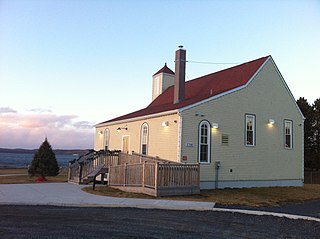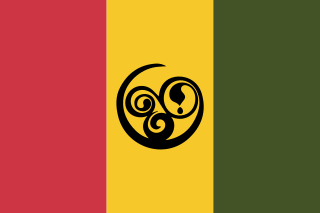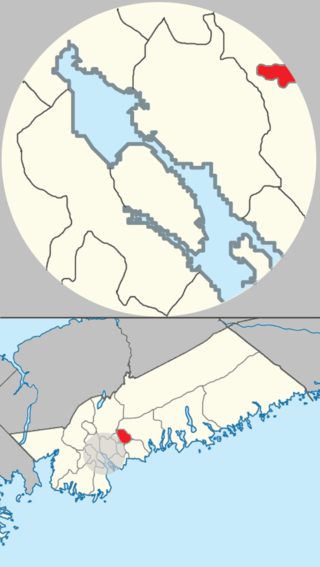
The No. 2 Construction Battalion, Canadian Expeditionary Force (CEF), was raised in Nova Scotia and was one of two predominantly Black battalions in Canadian military history and the only Canadian battalion composed of Black soldiers to serve in World War I. Commanded by Lieutenant Colonel Daniel Hugh Sutherland, formerly of the 193rd Battalion, CEF, all but one of the unit's 19 officers were white, the exception being Captain William A. White, the unit's chaplain.
Preston is a provincial electoral district in the Halifax Regional Municipality in Nova Scotia, Canada. It has existed from 1993 to 2013 and since 2021 and elects one member of the Nova Scotia House of Assembly.

North Preston is a community located in Nova Scotia, Canada within the Halifax Regional Municipality.

Africville was a small community of predominantly African Nova Scotians located in Halifax, Nova Scotia, Canada. It developed on the southern shore of Bedford Basin and existed from the early 1800s to the 1960s. From 1970 to the present, a protest has occupied space on the grounds. The government has recognized it as a commemorative site and established a museum here. The community has become an important symbol of Black Canadian identity, as an example of the "urban renewal" trend of the 1960s that razed similarly racialized neighbourhoods across Canada, and the struggle against racism.

The North End of Halifax is a neighbourhood of Halifax, Nova Scotia occupying the northern part of Halifax Peninsula immediately north of Downtown Halifax.
Preston is an area in central Nova Scotia, Canada in the Halifax Regional Municipality, located on Trunk 7. Preston includes the subdivisions of East Preston, North Preston, Lake Major, Cherry Brook and Loon Lake. The definition sometimes extends to include Lake Echo. The population in 2016 was 3,223. This is a decline from 2006, when Preston had a population of 3,536.
Cherry Brook rural community located to the north of Trunk 7 between Lake Loon and Lake Major, and just a few kilometres east of Dartmouth, Nova Scotia. It has a significant African Nova Scotian population.

Hosting the region's largest urban population, Halifax, Nova Scotia is an important cultural centre in Atlantic Canada. Halifax is home to a vibrant arts and culture community that enjoys considerable support and participation from the general population. As the largest community and the administrative centre of the Atlantic region since its founding in 1749, Halifax has long-standing tradition of being a cultural generator. While provincial arts and culture policies have tended to distribute investment and support of the arts throughout the province, sometimes to the detriment of more populous Halifax, cultural production in the region is increasingly being recognized for its economic benefits, as well as its purely cultural aspects.
Beechville is a Black Nova Scotian settlement and suburban community within the Halifax Regional Municipality of Nova Scotia, Canada, on the St. Margaret's Bay Road. The Beechville Lakeside Timberlea (BLT) trail starts here near Lovett Lake, following the line of the old Halifax and Southwestern Railway. Ridgecliff Middle School, located in Beechville Estates, serves the communities of Beechville, Lakeside and Timberlea.

Black Nova Scotians are Black Canadians whose ancestors primarily date back to the Colonial United States as slaves or freemen, later arriving in Nova Scotia, Canada, during the 18th and early 19th centuries. As of the 2021 Census of Canada, 28,220 Black people live in Nova Scotia, most in Halifax. Since the 1950s, numerous Black Nova Scotians have migrated to Toronto for its larger range of opportunities. Before the immigration reforms of 1967, Black Nova Scotians formed 37% of the total Black Canadian population.

Preston & Cherrybrook is a community and planning area of the Halifax Regional Municipality in Nova Scotia, Canada. It includes the villages of Preston, East Preston, North Preston, and Cherry Brook. The area was settled by African Nova Scotians following the American Revolutionary War.
Uniacke Square is a public housing residential area in the north central area of Halifax, Nova Scotia. It is flanked in the northeast by Brunswick Street and to the southwest by Gottingen Street.
Forest Hills is a subdivision in the community of Cole Harbour and in the Canadian province of Nova Scotia, located in the Halifax Regional Municipality.
Sylvia D. Hamilton is a Canadian filmmaker, writer, poet, and artist. Based in Nova Scotia, her work explores the lives and experiences of people of African descent. Her special focus is on African Nova Scotians, and especially women. In particular, her work takes the form of documentary films, writing, public presentations, teaching, mentoring, extensive volunteer work and community involvement. She has uncovered stories of struggles and contributions of African Canadians and introduced them to mainstream audiences. Through her work, she exposes the roots and the presence of systemic racism in Canada. She aims to provide opportunities for Black and Indigenous youth through education and empowerment.

The Africville Apology was a formal pronouncement delivered on 24 February 2010 by the City of Halifax, Nova Scotia for the eviction and eventual destruction of Africville, a Black Nova Scotian community.

New Horizons Baptist Church is a Baptist church in Halifax, Nova Scotia that was established by Black Refugees in 1832. When the chapel was completed, black citizens of Halifax were reported to be proud because it was evidence that former slaves could establish their own institutions in Nova Scotia. Under the direction of Richard Preston, the church laid the foundation for social action to address the plight of Black Nova Scotians. It is affiliated with the Canadian Baptists of Atlantic Canada.

William Pearly Oliver worked at the Cornwallis Street Baptist Church for twenty-five years (1937–1962) and was instrumental in developing the four leading organizations to support Black Nova Scotians in the 20th century: Nova Scotia Association for the Advancement of Colored People (1945), the Nova Scotia Human Rights Commission (1967), the Black United Front (1969) and the Black Cultural Centre for Nova Scotia (1983). He was instrumental in supporting the case of Viola Desmond. Oliver was awarded the Order of Canada in 1984.

The Black Battalion (1916-1920) Canada's best kept military secret is a 1987 book by Calvin Ruck, CM, about the No. 2 Construction Battalion, Canadian Expeditionary Force, the only all-black battalion to serve in World War I. It chronicles the contributions of black Canadians to the Great War (1914-1918), whose military heritage had been forgotten. Ruck served in the Senate of Canada from 1998 to 2000, and was honoured with the Order of Canada and Governor General's Award.

Joan Carol Jones was a Canadian businesswoman and civil rights activist who was born in the United States and raised in Ontario, Canada. She was married to Black Nova Scotian and internationally known political activist Rocky Jones, whom she influenced to become more active in the issues of black activism causes espoused by Malcolm X and writer James Baldwin, during the black radicalism period of the 1960s. Together they were among the founders of Kwacha House, an interracial youth club in Halifax and were later instrumental in bringing Stokely Carmichael and the Black Panther Party to Halifax. They adopted the radicalized language of the Panthers and organized with Carmichael's help the Black United Front, taking on issues of police brutality, employment and housing discrimination in the black community.












